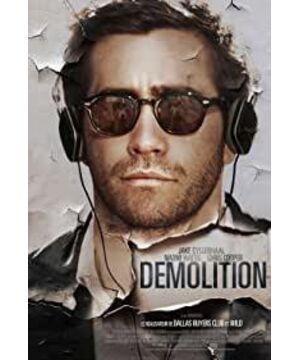Gyllenhaal's eyes really fascinated me, and the occasional laugh in the play reveals a silence or a whimper from his eyes. After his wife's sudden death, he couldn't "dig out" even the slightest bit of grief in himself. He twisted his face in the mirror but couldn't squeeze a single tear. He felt that he didn't love his wife. After meeting a single mother who attracted her, she seemed to have found a catharsis point in her life, and the memories of her deceased wife that flashed through countless times in the process of getting along with her seemed to confirm something. Starting from the leaky refrigerator, he dismantled all the things around him that had always existed but had never noticed it. He wanted to know what was inside, and he was obsessed with "digging" until he finally smashed the "marriage" house, as if this would really be the case. Unchaining the shackles of confinement, a fetal examination certificate, let him find out that his wife did not really love him all the time, love and marriage themselves are not shackles, the other party loves him or not, love has oppression, and then becomes a shackle, The female protagonist asked casually, "If you don't love her, why did you choose to marry her in the first place?" I think this is also the point of his invisibly imprisoning him later. When the male protagonist really opens his heart, he finally discovers his love for his wife. , said "We used to have love", the moment I cried, I seemed to be liberated, and the broken life of the male protagonist was recombined under repeated "digging". Like the title of the movie, the content of the film is very broken. It is hard to say that I really understand it. The child of the heroine chooses to be the best version of herself under the guidance and encouragement of the hero. The heroine of the drug addict also has deep maternal love and love. The kindness that is moved by the stories behind others, the merry-go-round at the end of the play, the male protagonist's first race (hahahaha), the old station wagon that you can always see (the male protagonist complains about what kind of idiots will drive a station wagon these days, hahahahaha) , are the points that attract me. The positioning given on Tencent is comedy, and the barrage is complaining. Can this be considered a comedy? Is it a comedy? I don’t know the principle and method of the film’s positioning, so I can’t make an evaluation, but I do seem to feel a sense of the absurdity of life from it, such as The male protagonist stepped on a nail, why the fuck does it hurt so much? Another example is that the outstanding scholarship student who was screened in layers and finally accosted the female protagonist at the party and wanted to have a shot. When the female protagonist heard such a person, she would actually be The outstanding student of the scholarship did not hold back his laughter, and hurriedly left under the eyes of others who were looking at the sick. This plot also happened to echo the previous male protagonist's disapproval, participation and disregard. It seems that the father-in-law said "
View more about Demolition reviews











